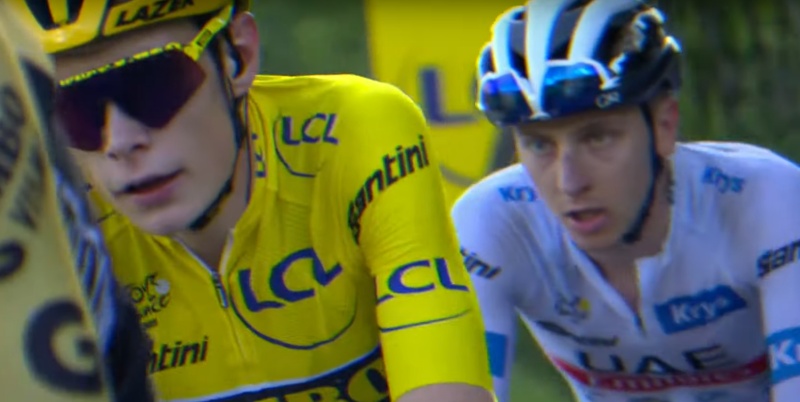
- Preview
- Stages 1-9
- Stages 10-15
- Stages 16-21
I can actually cover this middle week in a paragraph for all the significant developments there’ve been: Jonas Vingegaard’s lead over Tadej Pogacar has slipped from a barely meaningful 17 seconds to a neither-here-nor-there 10 seconds. Everyone else is now even further behind than they previously were.
I say that Vingegaard’s advantage is neither here nor there because it feels like, at some point, either he or Pogacar will go all Mortal Kombat and wheel out a decisive finishing move. But who knows? Maybe this is the race: two superhumans battling each other for two-second gaps and bonus seconds while everyone else slogs along several minutes further down the hill.
The fast forward bit
Technology moves on, but I still routinely record the Tour de France highlights on a digital TV recorder. This is for two reasons. (1) You don’t have to rely on ITV uploading the programme to its digital service (it sometimes takes them a while. (2) We have a ‘fast forward through the whole of the adverts’ button.
Seriously. One click and straight through the whole of the ads so that the programme immediately restarts. It’s maybe the greatest invention in human history.
For all that they mattered in terms of the general classification, the button could quite easily have seen fit to disregard the whole of Stages 10, 11 and 12.
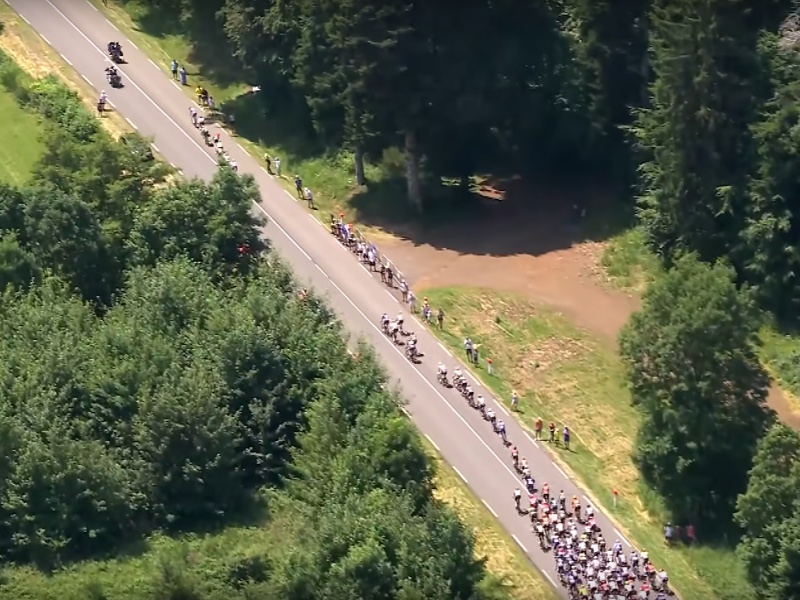
There was a breakaway win for Pello Bilbao on Stage 10, which vaulted him up to fifth, but other than that the overall standings pretty much held firm, right down to the time gaps.
Jasper Philipsen took his fourth win of the race on Stage 11 (this time without assistance from Mathieu van der Poel) and then Ion Izagirre made it two Basque breakaway wins for the week on Stage 12.
The week then finished with a trio of mountain stages.
The slow motion bit
Stage 13 was won by Michal Kwiatkowski from the break thanks to a combination of “the best legs I’ve had in my life” and “the most brutal effort in my life”.
A bit further down the final climb of the Grand Colombier, Tadej Pogacar’s UAE Team Emirates were maintaining a hard but not impossible pace. They were going fast enough to drop most rivals, but not so fast that their man didn’t still have it in him to do his mad acceleration thing in the final kilometre.
Pogacar duly did his mad acceleration thing.
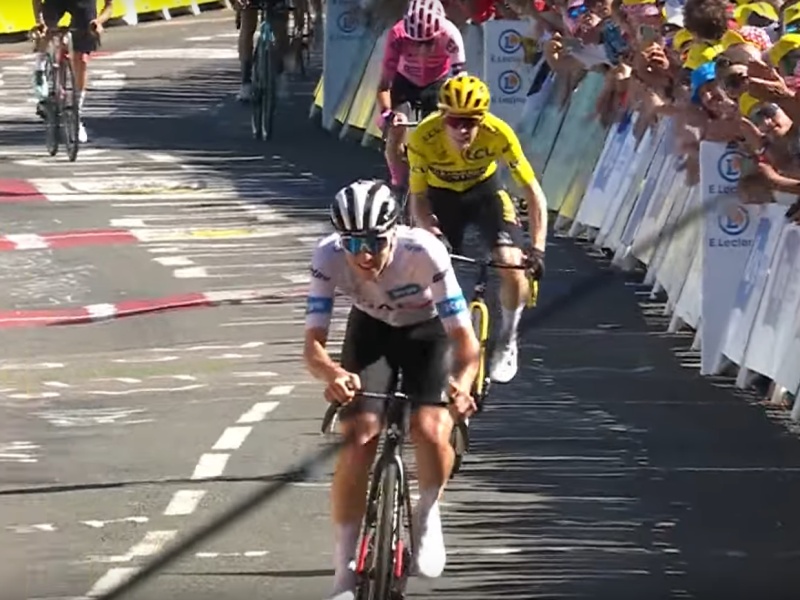
Usually an attack on a mountain is maybe five seconds of sprinting to make a gap and then settling down into a high pace to try and extend it. Maybe it’s because Vingegaard is so hard to shake, but Pogacar’s efforts are more like 20 seconds – and if that hasn’t fully done the job, he takes a one-second breather and then throws in another five seconds at full speed.
This has often seemed to be the shape of the race between the two rivals. Pogacar reliably gains seconds with his faster finish (4s plus a 4s time bonus on this occasion), while Vingegaard waits for opportunities to attack earlier in a stage with a view to perhaps gaining minutes.
Neither seems a particularly good plan, but one of them must be right.
Perhaps Pogacar felt the same though because the following day, on Stage 14, he attempted to invert that assessment.
This was something of a surprise given how he’d been looking. Pogacar doesn’t normally give much away with his facial expressions and this was one of the first times I’ve ever seen him looking pained or pissed-off, let alone both.
At one point he lost his cool both literally and figuratively when a water bottle slipped out of his grasp. Consummate team player, Adam Yates, immediately stepped in to give him his.
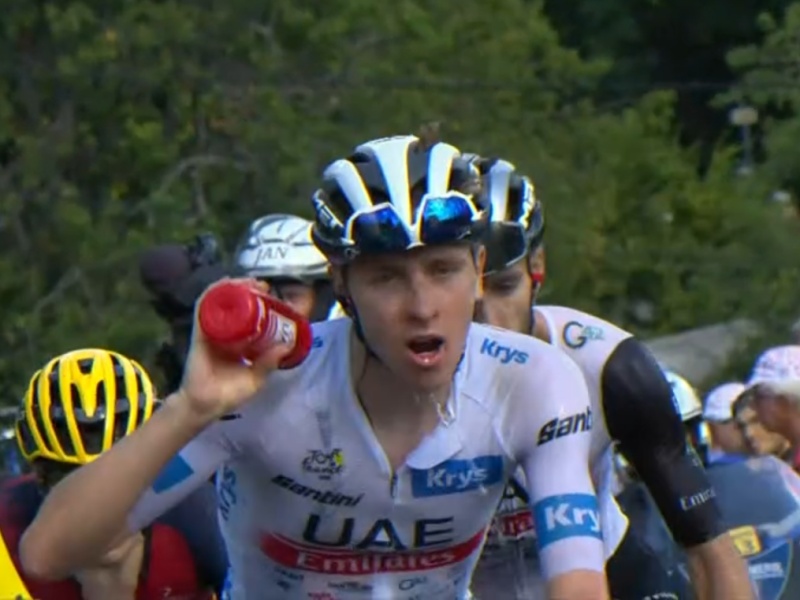
Then halfway up the long, hard (trust me, I’ve ridden it) climb of the Col de Joux Plane, Pogacar did his mad endless sprint thing and obviously dropped Vingegaard – because honestly, who’s following him when he does that? However, what really matters is what happens once he’s made his effort and returned to a sustainable pace. At this point – as it has tended to this year – the gap stayed pretty steady: three nothingy seconds. Both men were again moving the same speed as if one had the other on a giant tow rope.
Nearer the top Pogacar gave it up as a bad job and decided to proceed alongside his rival instead, confident he would outsprint him for the bonus seconds available at the summit and again at the finish after the descent. This did not happen. First he tried to dart off only to realise there were two motorbikes in the way. Then Vingegaard took him by surprise and crested the mountain first.
The short pause in hostilities leading up to that moment allowed both Yates and Spanish rider Carlos Rodriguez to catch up. The latter carried on past everyone over the top and down the descent and won the stage, which moved him up to third overall.
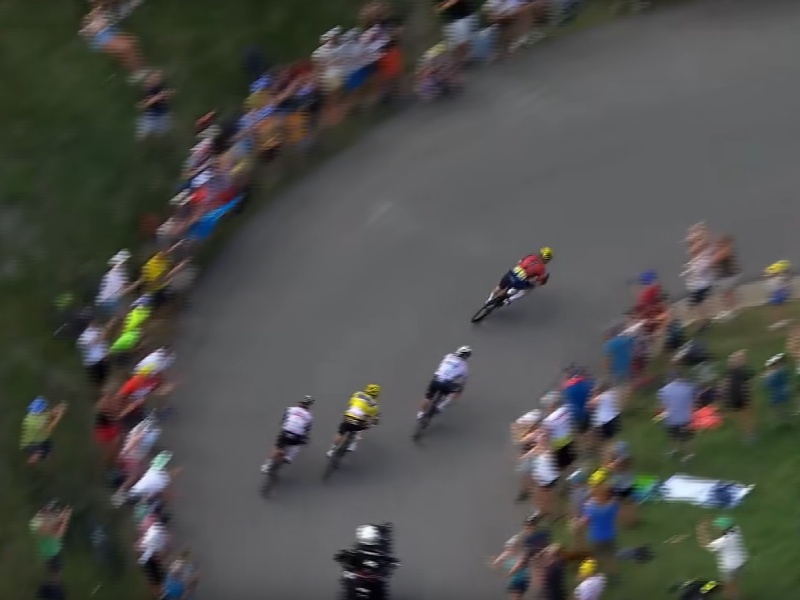
As I said in my preview, Ineos have kind of gone into this race with a bit of a “may the best man be team leader next year” approach to hierarchy. Tom Pidcock had performed pretty well until this point, but had slipped off the back on the Col de la Ramaz (which is also very hard), while Egan Bernal was already 50 minutes adrift. Rodriguez’s stage win therefore feels less significant than his overall position – particularly given he is only 22 years old.
Pogacar did eventually manage to use his faster finish to secure second place once they’d got down into Morzine. After a day of trading blows and time bonuses, the end result was that Vingegaard had extended his lead by one second.
Stage 15 then saw the two men revert to type, Pogacar having a go 500m from the line on a summit finish, but this time completely failing to distance his rival.
Time bonuses were not available on this occasion because 2016 Liege-Bastogne-Liege winner Wout Poels had already won the stage ahead of a whole load of other breakaway riders. The key moment for him came when he dropped fellow Wout, van Aert, on a steep gradient with about 15km to go.
This was no mean feat because a day earlier, van Aert had served up one of the most baffling passages of road racing you’re ever likely to see. Unable to hold the pace in the front group when Rafal Majka accelerated on the Joux Plane, the Belgian was dropped, came to a near standstill, recovered, sped up, caught the front group again and then returned serve by riding so fast that Majka himself was dropped. Pure nonsense.
Anyway, this is where we ended up.
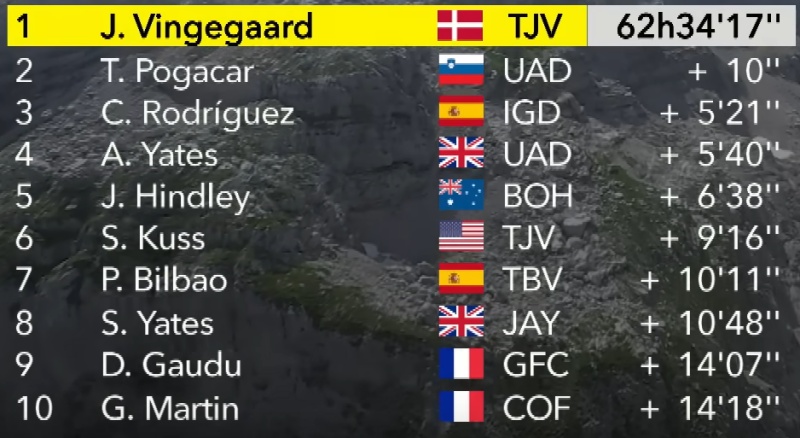
What’s next?
Stage 16 (Tuesday) is a 22km time trial with a tough climb in the second half that will surely – surely! – result in some sort of time gap one way or the other between our conjoined contenders.
I’m pretty sure Stage 17 (Wednesday) will separate them too. It’s mountain climbing all day and while it isn’t exactly a summit finish, there’s only a (fairly terrifying) 6km descent after the ludicrous Col de la Loze mountain cycle path on which Primoz Roglic got the better of Pogacar in 2020.
We then get a bit of a breather on Stages 18 and 19, neither of which offers much of a challenge, before a final opportunity to claw back ground with a challenging route through the low mountains of the Vosges on Stage 20 (Saturday).
Stage 21 is the usual Champagne-quaffing half-arsedness with a big old sprint finish.
I will be back at some point early next week with my final week recap. Sign up to receive it by email here if you don’t already get the emails.
Also, just a reminder that you can buy me a coffee or Belgian beer if you want to say thanks for these recaps. I’m very grateful whenever anyone does – more because it’s a nice gesture than because of my insatiable lust for hot and cold beverages (although that is also a factor).
Leave a Reply